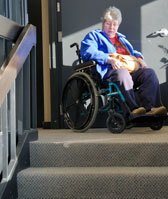 The Federal Disability Discrimination Act 1992 (D.D.A.) provides protection for everyone in Australia against discrimination based on disability. It encourages everyone to be involved in implementing the Act and to share in the overall benefits to the community and the economy that flow from participation by the widest range of people.
The Federal Disability Discrimination Act 1992 (D.D.A.) provides protection for everyone in Australia against discrimination based on disability. It encourages everyone to be involved in implementing the Act and to share in the overall benefits to the community and the economy that flow from participation by the widest range of people.
Disability discrimination happens when people with a disability are treated less fairly than people without a disability. Disability discrimination also occurs when people are treated less fairly because they are relatives, friends, carers, co-workers or associates of a person with a disability.
The following sections of the Australian Disability Discrimination Act are those that relate to premises.
The following sections of the Australian Disability Discrimination Act are those that relate to premises.
Section 3 : Objectives of the DDA
The DDA seeks to:
1. Eliminate discrimination against persons on the grounds of disability in:
- work, accommodation, education, access to premises, clubs and sport; and
- the provision of goods, facilities, services and land;
2. Ensure that persons with disabilities have the same rights to equality before the law as the rest of the community; and
3. Promote recognition and acceptance within the community that persons with disabilities have the same rights as the rest of the community.
Section 4 : Definitions
‘disability’, means:
- total or partial loss of the person’s bodily or mental function;
- total or partial loss of a part of the body;
- the malfunction, malformation or disfigurement of a part of the person’s body;
- a disorder. Illness or disease that affects a person’s thought processes, perception of reality, emotions or judgement or that results in disturbed behaviour;
‘associate’ denotes:
- a spouse or other relative,
- a co-habitee,
- a carer,
- a sporting, recreational or business companion, partner or colleague.
Section 5 : Direct Discrimination: less favourable treatment
Discrimination occurs if, because of a person’s disability, the person is, or is proposed to be, treated less favourably than a person without the disability.
Section 6 : Indirect Discrimination: unreasonable terms & conditions
Discrimination occurs if, because of a person’s disability, the person is required to comply with a requirement or condition:
- with which a substantially higher proportion of persons without the disability do or can comply; and
- which is not reasonable; and
- with which the person does not or can not comply.”
Sections 7 & 8 : Discrimination: use of devices & aids
Discrimination occurs if a person who has a disability is treated less favourably because he or she is accompanied by
- a palliative or therapeutic device or auxiliary aid,
- an interpreter, reader, assistant or carer,
- a seeing- or hearing-guide dog (or other animal)
Section 10 : Contributory reasons for discrimination
If an act is done for 2 or more reasons; and one of the reasons is the disability of a person (whether or not it is the dominant or a substantial reason for the act) then the act is regarded as being done for The disability-related reason.
Sections 15 & 17 : Discrimination in employment
A prospective or current employee (or contract worker) must not be discriminated against because of the person’s disability, or the disability of any associate:
- in the terms or conditions in which the employment is offered or afforded
- by denying access to or limiting the availability of benefits associated with employment
- by subjecting the employee (or contract worker) to any other detriment.
Section 22 : Discrimination in education
A prospective or current student must not be discriminated against because of the student’s disability, or because of the disability of any associate:
- in the terms or conditions in which the employment is offered or afforded
- by denying access to or limiting the availability of benefits associated with employment
- by subjecting the employee (or contract worker) to any other detriment.
Section 23 : Discrimination in access to & use of premises
Unless unjustifiable hardship applies, a person must not be discriminated against because of the person’s disability, or the disability of any associate:
- by denying access to or use of public premises;
- in the terms or conditions for entry or use of such premises;
- in the means of access to such premises;
- by denying the use of public facilities in such premises;
- in the terms or conditions for use of such facilities;
- by being required to leave such premises or cease to use such facilities.
Discrimination is allowed if premises are existing, and alterations required to make them accessible would impose unjustifiable hardship on the person providing the accessibility.
Section 24 : Discrimination in access to & use of goods, services and facilities
Unless unjustifiable hardship applies, a person must not be discriminated against because of the person’s disability, or the disability of any associate
- by refusing to provide goods or services or to make facilities available; or
- in the terms or conditions on which goods or services are provided, or facilities are made available; or
- in the manner in which goods or services are provided or the facilities made available.
Discrimination is allowed if providing the goods or services, or making the facilities available, would impose unjustifiable hardship on the person providing or making them available.
Section 25: Discrimination in accommodation
Unless unjustifiable hardship applies, a person must not be discriminated against because of the person’s disability, or the disability of any associate:
- by refusing application for accommodation; or
- in the terms or conditions under which accommodation is offered; or
- by deferring application for accommodation or according a lower order of precedence in any list of applicants for accommodation.
- by denying or limiting access to any benefit associated with accommodation ; or
- by eviction from accommodation; or
- by subjection to any other detriment related to accommodation; or
- by disallowing reasonable alterations to accommodation if:
- the person has undertaken to restore the accommodation to its condition before alteration on leaving the accommodation; and
- it is likely that the person will perform the undertaking; and
- the action required to restore the accommodation to its condition before alteration is reasonably practicable; and
- the alteration does not involve alteration of the premises of any other occupier; and
- the alteration is at the person’s own expense.
Discrimination is allowed if special accommodation services or facilities would be required, and their provision would impose unjustifiable hardship on the person providing or proposing to provide the accommodation.

